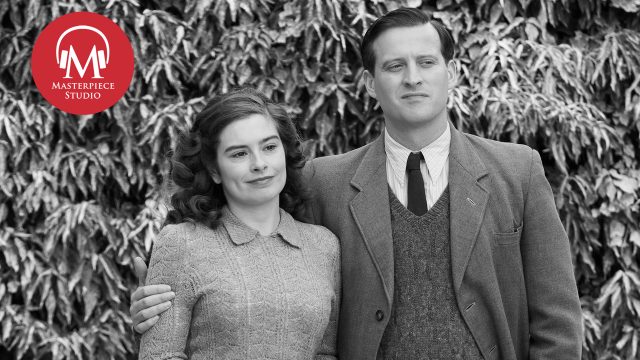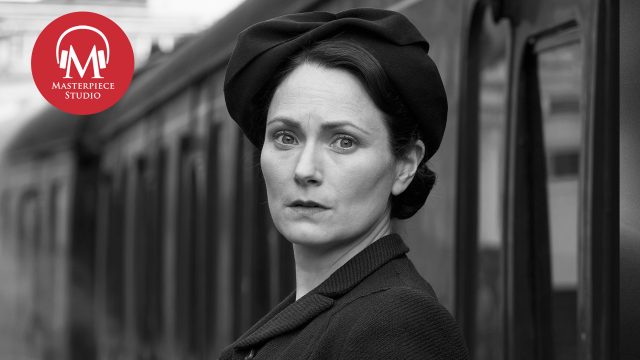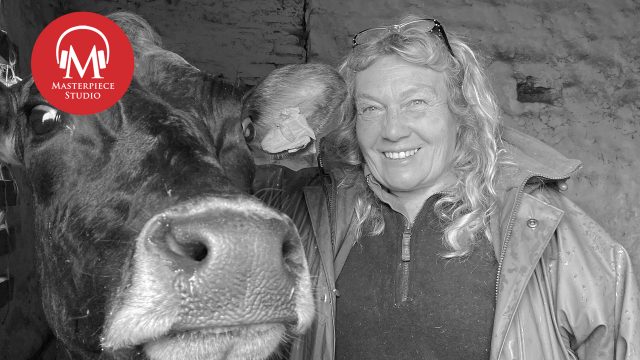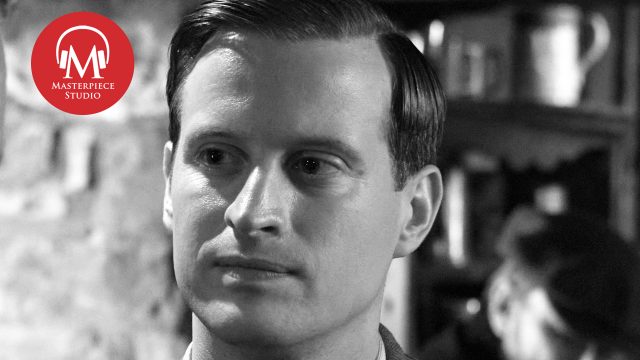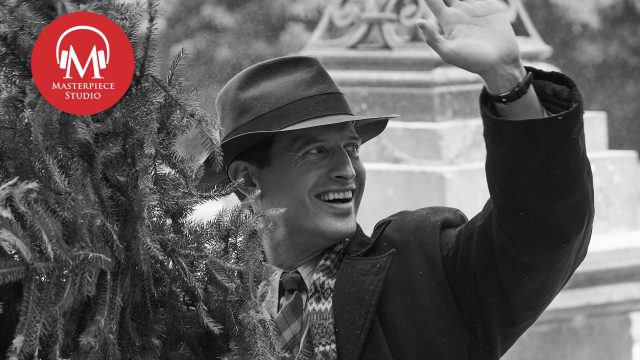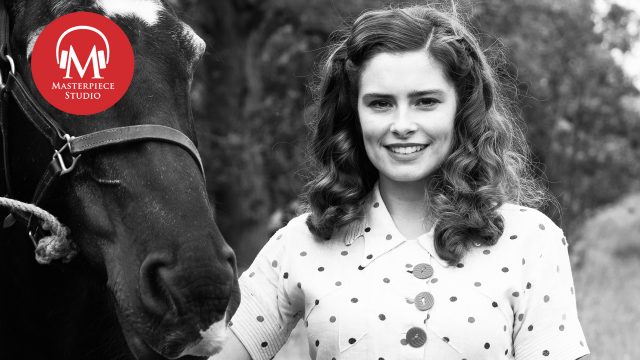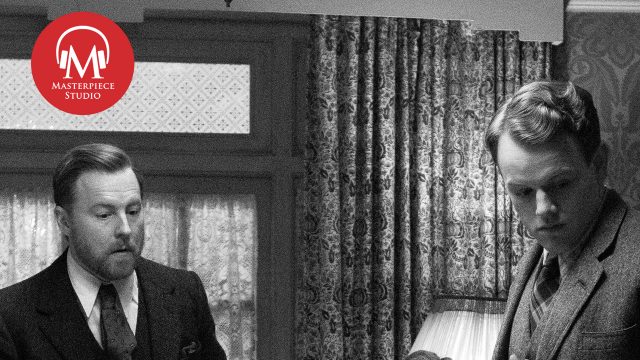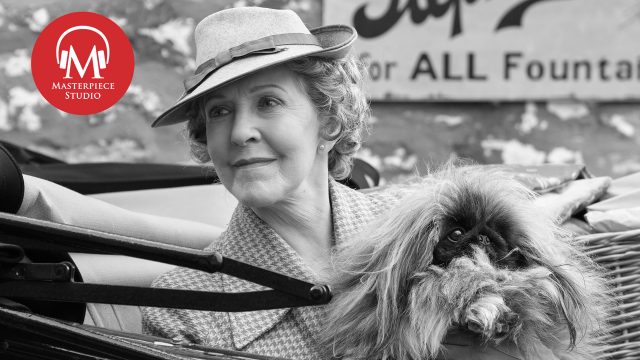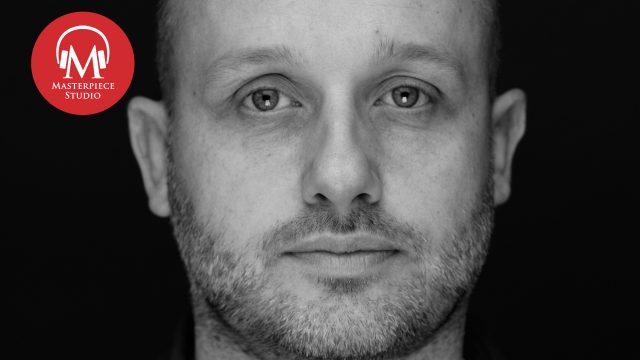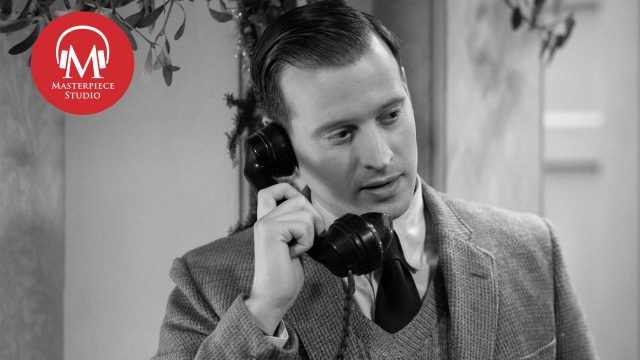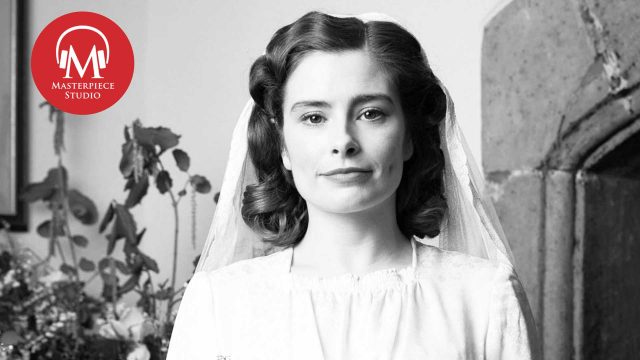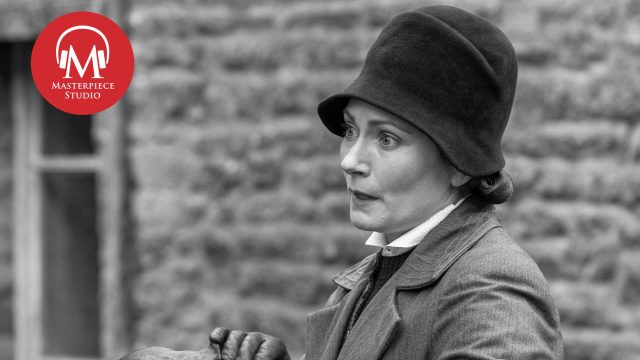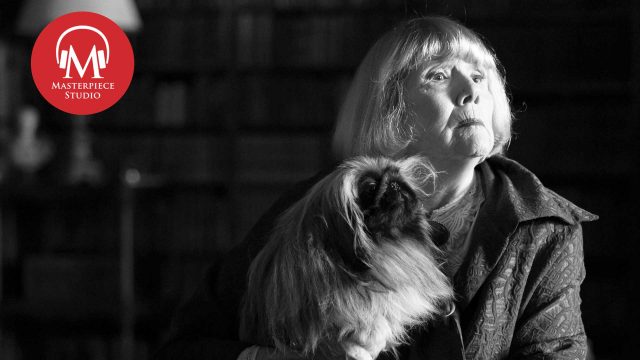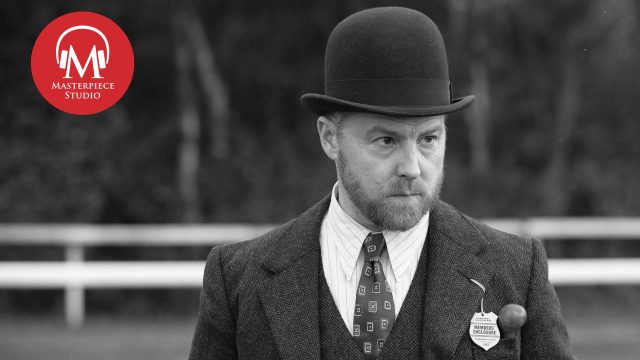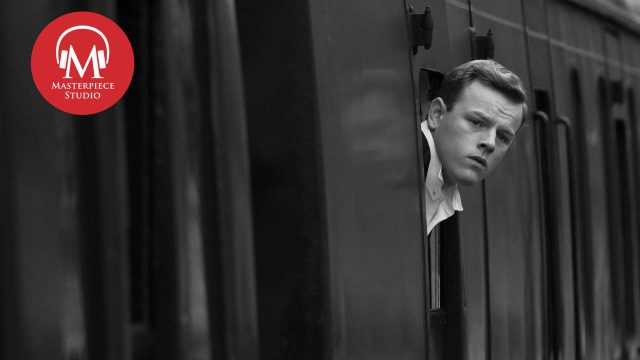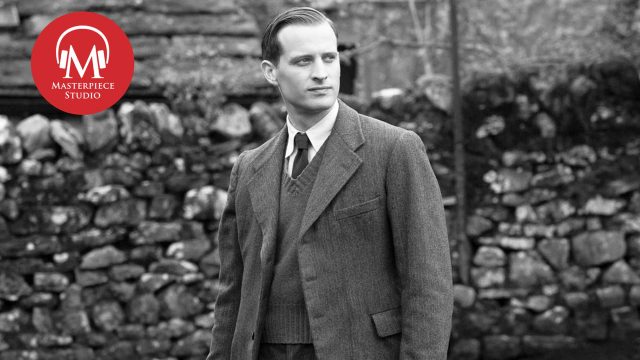In a buzzy new season of All Creatures Great and Small, the sassy divorcée, Diana Brompton, is a breath of fresh air. So, too, is actor Dorothy Atkinson, who brings her peppy charm to the podcast.
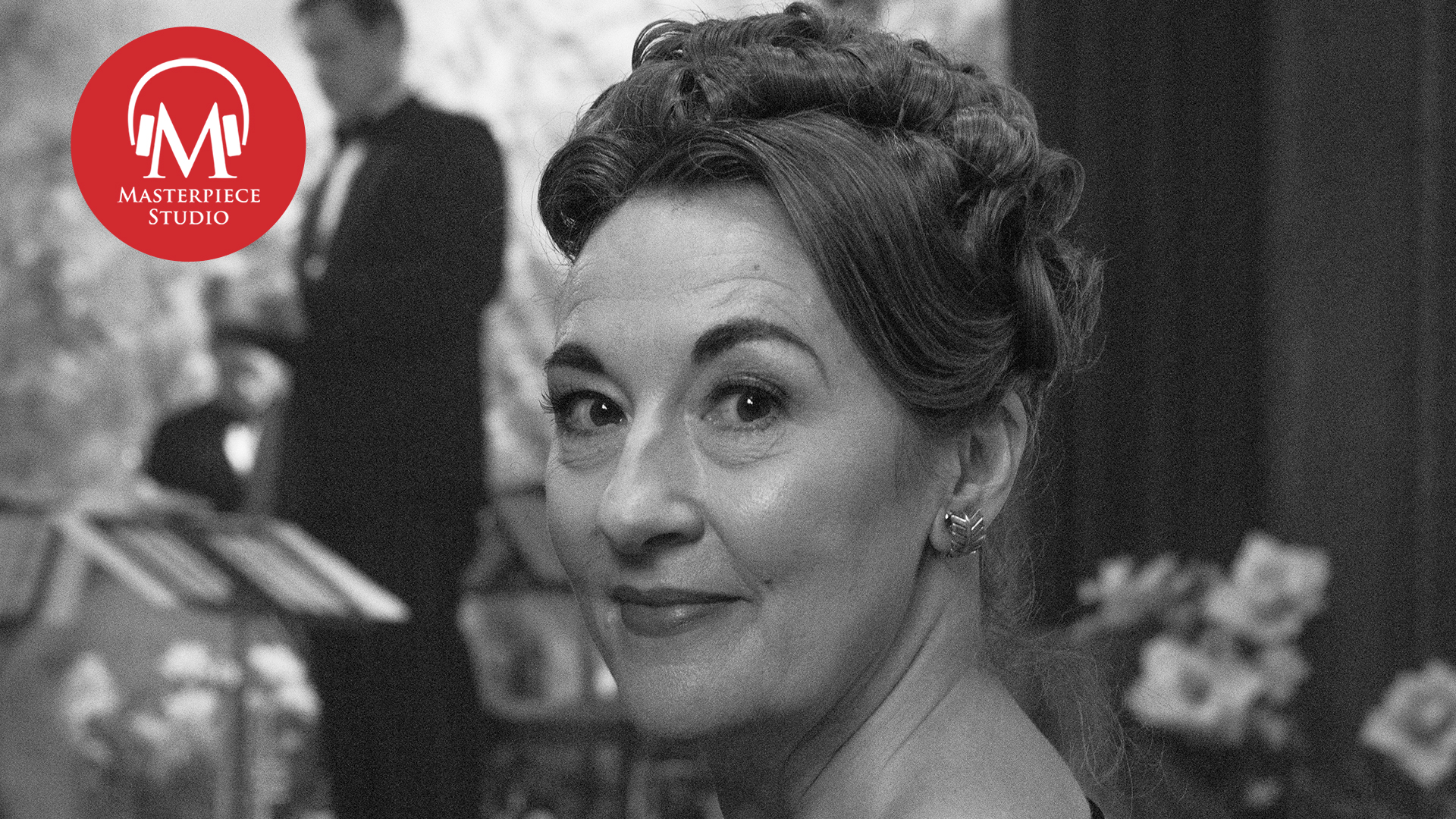

Darrowby Newcomer Dorothy Atkinson Is Right At Home In The Dales
Released 37:29
Related to: All Creatures Great and Small, Season 2
Download and subscribe on: iTunes | Spotify| RadioPublic
Transcript
Jace Lacob: I’m Jace Lacob, and you’re listening to MASTERPIECE Studio.
Siegfried Farnon is an eccentric, to say to the least. He’s hard to read, blunt and emotionally distant.
CLIP
Tristan Siegfried…I…
Siegfried Come now, Tristan. It’s alright to be frightened, for without fear, there cannot be courage!
Tristan Without courage, there can’t be pain.
Siegfried I’m called little buttercup, dear little buttercup…Try not to startle it!
Tristan Forget the pig, you startled me!
Jace Farnon is also a widower, decades older than his younger brother, and plays the role of a father figure for both Tristan and his young, new employee, James.
CLIP
Tristan No Rover?
Siegfried Not today, it’s leaking oil everywhere. Do your tie up man. We must present our very best self to the clients.
Jace But romance pops up for the prickly Siegfried in this second episode of the second season of All Creatures Great and Small, in the similarly surprising form of local divorcée, Diana Brompton.
CLIP
Diana That was very impressive.
Siegfried Thank you.
Diana Where are we going?
Siegfried No idea. I always like to sweep out at the end of an argument. But since we’re on the move, might I suggest somewhere more salubrious? The Renniston, perhaps?
Diana Why not.
Jace It’s only slightly a spoiler for us to speak to a new character this early in her tenure on the series — naturally, one can assume she’ll come back around Skeldale House sooner rather than later — but we can also credit the wit and charm of Dorothy Atkinson for our decision to speak with her on this episode.
Jace And this week we are joined by All Creatures Great and Small, star Dorothy Atkinson. Welcome.
Dorothy Thank you very much, hi.
Jace So first up, you were born, Caroline. Do you typically go by Dorothy, or do you prefer Dot?
Dorothy I typically prefer Dot, that’s what everyone knows me as. I’m officially Dorothy and I still love Caroline. My parents still call me Caroline — my parent. So, yeah.
Jace So you’ve got three names, three names you’re going by.
Dorothy I’ve got three names, I’ve got two surnames as well because I’m married to a Savage. But yeah, I’m officially Dorothy Atkinson, but everyone knows me as Dot.
Jace And where did the nickname come from? When did you start going by Dad?
Dorothy Well, my middle name is Dorothy, and in British Equity, I don’t know whether it’s the same over there. You can’t have the same name as someone else. And at the time, when I started in the industry, there was already a Caroline Atkinson. So given that everyone called me Dot, I just thought, Okay, I better be official and use Dorothy,’ but I kind of wish I’d just stuck with Dot.’ But it’s nice that you should ask because over the years, it’s sort of been something where I thought, ‘Oh, this is strange. I’ve got so many names,’ but then I quite like the feeling those different monikers give me. So when I go home to my mum and my sister, I’m Caroline. And in fact, my mum bought me a gold C for Christmas, and it was a really nice thing to receive, that said that very private part of myself is probably still Caroline.
Jace I love that. You joined the cast of All Creatures Great and Small in series two as Diana Brompton. How familiar were you with the Alf Wight books, or the earlier 1970s run of All Creatures?
Dorothy I was very familiar with the earlier TV series, which was such a favorite in our house. I mean, it was bang on the right timing for me as a kid and it was proper, family viewing, and you know, back then when there were three channels only, it was such a highlight of the week and something that we’d sit and watch together after eating together and just, yeah, it was a real bonding thing and something that was set in Yorkshire. I’m not from Yorkshire, but I’m sort of northern, I’m from the Midlands, but it was like, ‘Oh, this is, this is something we know. I live somewhere sort of semi-rural.’ So, yeah, it was massively important and the characters were so clear. And I think that might have been a bit of an entrée into me wanting to go into that world. I didn’t know that at the time, but I haven’t read the books and because my joining the series happened very, very quickly, I didn’t have, I would normally for sure have read everything about it and try and get it as authentic as possible from my point of view. But I just didn’t have time to read the books. But I’d watched the first series and I watched it with my mum and it was so, such a beautiful version of it and which I’m sort of skeptical of things being made again, but I was totally blown away by it. So yeah, it was all good.
Jace You joined in the second series. Was it strange coming into a cast that had already been established in that first series? Or did it help in a way to have Diana be an outsider coming into Skeldale House?
Dorothy Yeah, I think it’s always a bit of a gift actually to come into something that’s established. Because you’ve got your interpretation firmly in your head and it feels like a privilege, actually. And weirdly, I never get like this, but I was a bit nervous because the cast is so clean and clear and beautiful on screen and have this calmness. So that actually was quite daunting because I know I was required to be quite effervescent, but that, you know, they made me so welcome. But it’s quite strange. It’s not so much entering the cast, it’s entering the scenery because you’ve got a picture of the house in its entirety as a viewer, and when you go in and it’s a set, I mean, I know how things work, but when it’s such a familiar set, you’re like, ‘Oh, it’s smaller, it’s bigger. That’s that’s not real.’ But that house, the house feels like another character to me, and as does the scenery, beautiful Yorkshire. It’s such a huge presence. So I think I was quite excited to be in the house and slightly trepidatious around the cast, but that only lasted about ten minutes, and then the ice was broken.
Jace Diana Brompton appears first in episode two. She’s described in the script as having a forthright demeanor and ‘a bit of a twinkle about her,’ what you called earlier, her sort of effervescence.
CLIP
Tristan To what do we owe the pleasure?
Diana Well it’s that time of year.
Tristan Oh the Daffodil Ball. I have been counting the days.
Diana And who’s the lucky lass tonight?
Tristan Who can say at this point, Mrs. Brompton. Ah, Jim! Jim! Perfect timing. Err wallet!
James I’m sorry, what am I paying for now?
Diana It’s the Daffodil Ball tonight. All proceeds go towards the restoration of the steeple.
Jace What do you make of Diana as a character? How do you see her?
Dorothy The reason I really liked her, I see her as a modern woman for 1938. To be divorced then was really, really rare, especially in that part of the country. Up until 1937, a female couldn’t cite adultery as a good reason for, to be granted a divorce, but a man could, I mean, that’s what we’re dealing with. So for her to be a divorcée, and she owns it, I just think she’s a representation, she’s a door open and then in comes the next part of life in that place. Modern women are independent and don’t really give a stuff about what other people think, especially in a very tight community like Darrowby. I think that’s her reason to be there. And I really liked that about the character.
Jace I mean, you’ve you’ve excelled throughout your career in both comedy and drama, and Diana Brompton offers both. Yeah, along the lines of what you’re saying, there’s the the scene at the Daffodil Ball. She she has this line that I love, about having murdered and buried her ex-husband. I mean, did you relish the opportunity to play with the sort of dramedy aspects of Diana’s character that the kind of comedy and pathos that she is clearly embodying here?
Dorothy Yeah, well, I’m glad that’s come across, yeah, I do, I mean, you’re right, and I I do that. Dramedy. I’m going to use that Jace. It’s brilliant. Yes, that’s that’s absolutely the sweet spot of how I like to work, and sometimes I’ll get callbacks that I’ve said, ‘Can you do it without being funny?’ And I’m thinking, ‘I didn’t realize I was.’ But I think that that’s what’s so lovely about it. Because, you know, it’s a thing that’s often said, but, you know, out of the most hideous drama in your life can come comedy and that that black humor, which is very British as well, that’s totally totally my bag and I love any opportunity to try to get that in.
Jace I mean, basically, tragedy plus time equals comedy. And Diana clearly mines that equation. You know, that this is something that has sort of deeply hurt her. But enough time has gone by that she can sort of deflect from the pain by using comedy as a sort of armor. There is clearly an attraction between Diana and Siegfried Farnon at play, even in this first episode. What does Diana make of the rather persnickety Siegfried, and what does she find most attractive about him?
Dorothy I think she’s amused by the persnickety. I think they’re both at an age where you know, you’ve seen so much and you’ve seen lots of different characters in your life, play out, come and go, and that it’s that it’s maybe something that’s familiar to her. I think they’ve met their match. I think they they spar off each other and they’ve been around the block and there’s there’s an attraction in just being instantly comfortable with someone at an older age when there’s no expectation from it, I think that’s I think that’s the draw.
Jace Even at the Daffodil Ball, Diana is sort of at a remove from the others. We touched on this earlier, as a divorcée in 1930s Yorkshire Dales, Diana, while being the subject of some gossip, doesn’t dwell too much on public opinion. Does she move with a bit more freedom through Darrowby than other women might? Do you feel that her money insulates her in a way that if she had been in a different class, perhaps she wouldn’t have the freedom she does?
Dorothy Yeah, maybe. I think you’re right to use the word class it very much existed then still does. But I think I think it’s to the spirit in her rather than the the wealth or lack of wealth that her spirit is to. She’s feisty and I think as a working-class woman, she’d be feisty, she’d be out in the fields digging potatoes and feeling no different from the man and I. You know, it’s loading a bit, because it’s. But that’s that’s OK, that’s that’s our job is to think, you know what, what would she have been in other worlds orm what was she before? And you know, I think it’s the spirit rather than the trappings that bolster her.
Jace I mean, she’s even rather amusing about her own peccadilloes, such as her husband having it off with both the housekeeper and the gardener.
CLIP
Siegfried I was sorry to hear about you and your husband.
Diana Which was it? The housekeeper or the gardener?
Siegfried Oh I don’t hold for such tittle-tattle. Both actually.
Diana I wouldn’t blame him if it was the gardener – he was quite the dish. There’s even one going round where I’ve got old Len buried in the basement. That’s why no one’s seen him for so long. I don’t mind that one so much. It keeps everybody on their toes.
Jace Is this a coping mechanism turning tragedy again into comedy or is she just, as you’re saying, just sort of cheeky? Would she have been just as cheeky had her marriage remained intact?
Dorothy I think she would, yeah. Yeah, and I think there’s a bit of her that enjoys the shock tactic and that maybe that’s how she measures whether she’s going to get on with someone, their reaction to her being cheeky. The other thing I liked about playing Diana is she’s a big ball of that sensibility of my grandmother’s generation. You know, there was no messing. They were feminists, proper feminists without knowing it. You know, they, for instance, my grandma, she’s from Yorkshire, and she cycled 30 miles every day to go and work for family and do all the work in the house that, you know, as the maid, cycle back and then look after her five brothers and do all the same again at home, without complaint. And my other grandma worked in a lace factory in Nottingham, and it’s, you know, they’re obviously touching distance for me. And it’s not that far ago, so that spirited woman is massively part of what I knew, what I know, and what I know still exists. And it’s nice to see that represented in the show.
Jace We get the sense that Diana perhaps has had designs on Siegfried for a while now, that a widowed vet might be quite a catch for divorcée Diana. Is she looking for stability? Is that her, her sort of main goal right now, is that what she sees in Siegfried as an allure?
Dorothy I think she sees in Siegfried someone who’s worldly, who has been out there, navelgazing and scholarly but is practical and you know, he’s a lovely, handsome, smart, witty, clever man. It’s like, of course, she’s going to fancy him. I don’t think it’s for the money or the status. I think it’s the company. She’s rattling around in a big house and her husband totally let her down and embarrassed her. So she’s rolling her sleeves up and and going out to have a good time. I think it’s I think it’s I’m not saying it’s shallow, but I don’t think she thought things through that much. I think it’s, ‘Yeah, he’s lovely. I’m going to see if I can get to know him.’
Jace I mean, Diana is a divorcée, no matter how merry she might paint herself to be. Siegfried is a widower. In a way, do you see Diana and Siegfried as somehow being connected by a shared sense of loss in their lives? Is this a commonality that they have?
Dorothy I think it could well be, yeah, yeah. And as I said before, at a certain age, I think it gets hard to meet people. I think to just have a shorthand with someone and just get each other, you’re going to latch on to that. I think it’s a rare and lovely thing when that happens when you’re older.
Jace For me, All Creatures Great and Small might be the most consistently comforting show on television. Why do you think the show has clicked so deeply with viewers on both sides of the Atlantic?
Dorothy Well, I think for the UK, there is a, the comfort of watching something that’s that you kind of know the story of, and that is its reincarnation is so beautifully shot and he is a reminder of what a gorgeous country we live in. When I watched it, I I watched it with my mom, I sat down with my mom and she wanted to watch it. And what really struck me was that the casting is so brilliant and that each of the main five characters are so clean and clear and familiar in terms of, ‘Oh, that might remind you of someone in your family.’ The acting is really spare and and simple and pure, and I think that’s something really lovely to see. I think, you know, when I joined, it’s like, ‘I need to be aware of this style of action here and the pacing because it’s very, very subtle and beautiful, and I’m coming in with a big, bouncy character. I’m going, you know, I’m going to have to hold on to the reins,’ because I just think they played it beautifully. I think that’s a big draw. And there’s no one gets murdered. There’s no zombies you know, appearing out of the Dales and the world is in a good place. I know the War is coming now, but it’s just that the simplicity and beauty of it, I think.
Jace Before this next question, a quick word from our sponsors…
One of my favorite performances of yours was as the acid-tongued Pauline on one of my favorite comedies, Mum. I have to ask, what would Pauline make of Diana Brompton?
Jace This isn’t the only appearance, fortunately of Diana Brampton this season. In fact, it appears as though things between Diana and Siegfried are going rather swimmingly. What can you tell us about where their dynamic might be going for the remainder of this series on All Creatures?
Dorothy Well, a lot of it is about, it’s sort of reported what might be happening, and I think everyone wants to know, everyone in Darrowby would like to know, and may be gossiping about it, that no one actually does, they’re very discreet. But I think he definitely has been popping round, shall we say.
Jace One of my favorite performances of yours was as the acid-tongued Pauline on one of my favorite comedies, Mum. I have to ask, what would Pauline make of Diana Brompton?
Dorothy Well, she’d be a rival, wouldn’t she? She’d been a well, ‘Who who does she think she is?’ And she’d be scared of her because I think Diana is completely free. Free spirit, free…she’s totally comfortable in her skin. And Pauline is the antithesis of that. So I think she’d be threatened, therefore waspish, therefore just say something hideous to her and not like her. But at the same time, she’d want to impress her as well. And yeah, that wouldn’t end well. I don’t think it’d be a good meeting.
Jace No, no. ‘Once you’ve been to Morocco, you’ll never eat an orange here again,’ said Pauline about why she doesn’t eat oranges in Britain. To me, there’s never been quite another character like Pauline. She’s got the snobbery of a hyacinth bouquet, but her own very unique attitude. What was your take on the character and her complexity?
Dorothy When I read the script, there was not he wasn’t giving away much, the brilliant writer, Stefan Golaszewski, and said so, and he wouldn’t appear in the room. He didn’t want to meet people in the room. He just wanted to see the interview and you through the camera and your interpretation. But as soon as I read the script, I thought of three people that I will never say who they are, sprang to mind. So she’s kind of an amalgamation of those three people, the good and the bad. And I, just there was just something that I completely, I can’t say I identified, because that doesn’t reflect well on me, but I completely gobbed. I just thought, ‘I know this woman, I know her,’ and I don’t think I’ve ever wanted a job, that part that much. But so, yes, so then there wasn’t much on the page, and we just played around in this in the interview and it just felt right. And thankfully it was right for them as well.
Jace I mean, you say you sort of recognized the character a bit, but I mean, to me, that sort of begs the question, did you like Pauline? Do you have to sympathize with a character in order to play them? Is it a matter of finding some humanity within the character? Or maybe you didn’t like Pauline?
Dorothy Oh, I didn’t like her. And actually the the writing later on when once once we’d got her up and running, and then Stefan found ways of making her more human and fallible. But to begin with, a lot of the lines like, ‘Jeepers, I’m not going to say this!’ and he said, ‘Just go for it, just say it, it’s horrible. I know, just say it.’ So no, I didn’t. I didn’t like her, but because I wanted to make her human. I suppose that it’s not even warmth, is it? The humanity does come out. And then, then and then we did work more on what’s actually going on. But it was more a case of I didn’t do an impression of that person that I took from that person. I knew a few people, just little traits that that built up the character. So I did get to love her, and I sort of miss her now, but she’s right under the surface and my husband has seen her in our house at times.
Jace Oh my god.
Dorothy But there must be a bit of me that is like her, because it does feel close to the surface. Some parts of her.
Jace I mean, you were on Mum opposite Lesley Manville and Peter Mullen for three series. What was it like working on the show? Did it feel while you were filming it, that this show was something really special and unique and different?
Dorothy It did. It did, actually. We did a pilot way back in 2015, which became the first episode and every day, I mean, we were a very close team right from the get go and very compatible, very supportive, which all which all feeds and of course. So yeah, we we did and we after the pilot,we ‘Ooh I hope we get a series!’ and then even, ‘Will we get another episode?’ and then it just grew and grew and then, ‘Oh, are we going to have series two?’ But we always knew it would only be three. And so maybe knowing that made us really appreciate every single episode which we did and all the characters come to the fore at different times, and they’ve got huge worlds going on in a very simple setting. It’s genius writing and. I think all of us who had seen Stefan’s previous show, which is Him and Her, knew that it was going to be quality, that only us would let it down. So we properly invested and adored it and adored each other, without wanting to be too lovified, but we really did because it was a special, special show. And you know, the actors, just having Leslie and Peter and blimey, they’re just, you know top drawer, aren’t they? And known for breaking your heart, and I think having that as a basis and then being funny on top, you’re on to a winner.
Jace Oh yeah, I mean, every episode would just break your heart and make you roar with laughter, and few shows can really pull that off.
Dorothy We were all very satisfied at every point with the scope of the whole show and the material and what we had to play, everyone was really, really like, ‘Oh, thanks, thanks for the gift of those lines, those storylines, everything.’
Jace I am curious, did you always want to be an actor? Was there a specific formative moment in your life where that desire to perform just clicked into place?
Dorothy I think I did always want to be an actor. I didn’t know that’s what it was. I did dancing when I was young, which was pretty undisciplined. I mean, I took exams in ballet and tap and things like that. But my dancing school was in a in a beautiful ballroom that every town had back in the ‘70s. But the ballet was done in the bar area of the ballroom. And so when we did our pliés, our hands were on the actual bar, not the French barre with an e. So but that whole exciting showbizzy world started there. And I was a mimic. I have an older sister, Jo, and she used to say, ‘Do this person, do that person,’ and it was never like someone off the telly. It was always people we knew. And I basically liked making my big sister laugh. And so it started there, but then as I got older, when I left my school, I did my A-levels at a drama, but I did it sort of early drama like a college before I went to drama school and it was there. So I’d left my little town and went to Nottingham, it’s quite a famous place, Clarendon College in Nottingham. And I just met people like me and I didn’t really. I didn’t know they existed, I thought I was just a bit of a dreamer. So the age of 16 meeting that group of people who were into the same thing as me was the seminal moment, I suppose. And then I just sort of carried on from there.
Jace Your first job was at the Polka Children’s Theater in London. Opposite MASTERPIECE mainstay Keeley Hawes, who was 12.
Dorothy Yeah, that’s right.
Jace What do you recall of that experience of that first job? What was that like?
Dorothy Well, I couldn’t believe my luck, that seriously, I couldn’t. I expected it and hoped but not expected it. I hoped for it and was not surprised to be working. But. the reality of getting paid and doing what you love was just brilliant. And, you know,it was fortunate for me, it was a really inspiring woman who ran the theater, Vicky Ireland and, working with Keely. She was 12, I was 21, she was 12, and we’ve never worked together since. But I’m just about to start something with her.
Jace Oh, wow.
Dorothy That’s just going to be good. I mean, we’ve sort of watched each other over the years, but even then, she was just she was just so together, and free and, you know, a lovely person and brilliant, age 12.
Jace You’ve worked with director Mike Leigh throughout your career. IndieWire called you ‘a Mike Leigh muse.’ What is Leigh like as a director, and how would you describe the creative energy on his sets?
Dorothy Oh, he’s just yeah, he’s a. I kind of start to get a little tremor in my voice when I speak about Mike because he is kind of, I mean, I’ve always worked and, you know, been successful in a low key way. But he he sort of gave me a break and. It sort of meritoriously just, you know, I turned up and had a good chat with him and he saw something in me, and I’m forever grateful for that. That said a bit to begin with. I was quite I was quite nervous about working with him and I’d never worked in that way before, which is to thoroughly, thoroughly think laterally about the character. And you spend a lot of time, even if you have two hour sessions with him at the beginning of a film, just building a character and that way of working, trying think different things out, discussing the whole scope of that person’s life from being a baby to where they are now, just just having that luxury of time with him. And being guided through it, so I like to approach my work like that now, I don’t spend as much time because that’s quite a disciplined thing to do on your own, but to to take a step back and look at the character. So it’s not, so you’re looking objectively at the character. You always work using a third person so you don’t refer to the characters. ‘Oh, I did this, I did that.’ So it’s, ‘She. She’ll do this, she’ll do that.’ And it really makes you stand back and look at the work you’re doing. And are you representing that person properly? So that’s a long way of saying, you know, discipline with Mike and just his huge brain and his humor, which you don’t always say in an interview, but that’s that’s that’s the way we connect. And just that, the collaborative nature of the whole, thing, making a film and, you know, he knows every person’s name, every person, something about every person on the crew because he’s interested and he remembers things and everything feeds into making a very naturalistic world that exists in his films. And you know, you. You have agency, your character’s agency, you as an actor, have agency to say, ‘I think my character might need this,’ and you’re so much a part of how you look, how your costumes and with all the brilliant people records together. So the word is collaboration, is what he offers. And just improvising, you can’t, you know, when you’re a kid and you made a play, you just had no qualms about improvising. ‘Pretend to be this. You do that, you do that.’ And it’s kind of a very disciplined version of that, and it’s completely freeing. And hopefully, you come out with something authentic. And when I’ve been in a Mike Leigh film and you go to the premiere or you go to the cast and crew, I’m never say that thinking, ‘Oh God, I hope I’m alright,’ because I don’t care because it wasn’t me, it’s the character becoming itself. So you’re not judging yourself, watching yourself. You’re watching someone else. That’s a big difference working with Mike and having said that, I do think I’ve done my best work with him.
Jace You met your husband, Martin, the aforementioned Mr Savage. How about working on on Mike Leigh’s Topsy-Turvy. I mean, did you realize at the time that this would change your life in multiple ways?
Dorothy No, I didn’t at all, and I didn’t like Martin. I liked a lot of people but I didn’t like Martin, and it wasn’t really a kind of, it was a slow sort of, ‘Oh now, I like him. Oh, he’s really funny,’ and then I just stood next to one day and was like, ‘Oh God, I fancy him as well.’ And yeah, I really didn’t expect that and I didn’t want it either. I was actually in a relationship and I wanted to really focus on this fantastic break I’d had and didn’t really want anything to get in the way, but as with all Mike’s films, they go on for such a long time that it then becomes your world, and to have Martin right there with me was just a dream.
Jace Oh, bless. You absolutely broke my heart as the painfully shy Jane Sutton in series two of Call the Midwife. How would you describe your experience of working on Midwife and do you ever wonder what would have happened to Jane if scheduling conflicts hadn’t made it impossible for you to return?
Dorothy Yeah. That came at a great time for me. Call the Midwife. I was in a in a theater show in the West End and then we transferred to the St Ann’s warehouse, the fantastic theatre in New York, and then the following year we went to on Broadway Studio 54. It was a production of Brief Encounter, so I went to live in the States for for the nine months we were there and it was just amazing. And, you know, I just thought, ‘Oh, I’ve been reborn. I live in America now. I mean, I’m a New Yorker,’ and it’s completely I had this fantastic time and the family came over. Then we came back and I was really like, oh, really low and nothing happened. I think it was a reflection of how I was feeling. Nothing happened for a year, almost. And it was really tough. And then Call the Midwife came along and I got the gig that was my first ever self-tape, actually.
Jace Really?
Dorothy Yeah, I love it. I love self-taping because you can go for it in a way you can’t in the room and that was my first one, and of course, that’s the first step, and of course, they meet you. But it was a real like, ‘Come on you, but you can get back in the game,’ and I’d not been on TV for a long time, actually. And so it read it was really great, and I’m so glad they trusted me to do her. And it was again, that was an established show, and I loved the first series and I read the books inside out, back to front, upside down. And Jane was a real person. And I so immediately you think, ‘Well, this, I’ve got to be authentic. I need to honor this person.’ So it was a really sad, sad story. Hers was a very sad story, but at the same time, she got the wherewithal to drag herself out of the difficult situation and the strength to carry on and make, you know, make something of herself. So it felt like a complete honor doing that part. And yeah, and it sort of set the ball rolling for what, you know, what has turned out to be a good purple patch. So I’m really grateful to that show, and I loved the girls and the well and the fantastic out older women, the actresses. And yeah, it was a brilliant team.
Jace Dot Atkinson, thank you so very much. It’s been a pleasure.
Dorothy It’s been an absolute joy to speak to you, Jace. Thank you.
Jace We have another new actor next on the podcast — but her role is already well-established in Darrowby.
CLIP
Siegfried We’ve just heard, Hutton beat Bradman’s record.
Mrs. Pumphrey Terrific! Of course Tricki suffers most dreadfully from travel sickness, so we’re forced to be apart for the duration. It was the whiff of manure wafting from the pitch that made me yearn for home and my beloved boy. Which reminds me, I do hope that you’re practicing your inswinger ready for my little cricket match this summer.
Jace Patricia Hodge, who slips elegantly into the role of Mrs. Pumphrey after Dame Diana Rigg’s death in late 2020, joins us here January 23.
MASTERPIECE Studio is hosted by me, Jace Lacob, and produced by Nick Andersen. Elisheba Ittoop is our editor. The executive producer of MASTERPIECE is Susanne Simpson.
All Creatures Great and Small Podcasts 16 More Podcasts
MASTERPIECE Newsletter
Sign up to get the latest news on your favorite dramas and mysteries, as well as exclusive content, video, sweepstakes and more.











